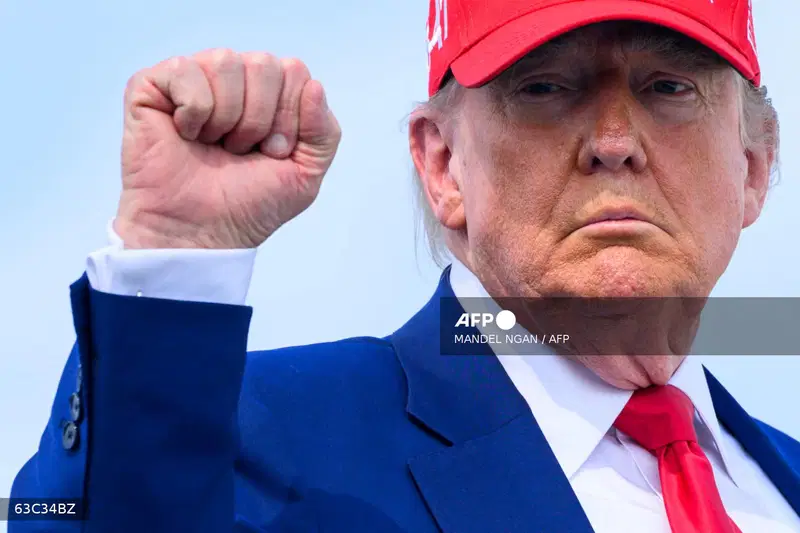Headline
Badenoch Slams UK PM For Cutting Defence Funding Amid Global Threats

The Leader of the Opposition, Kemi Badenoch, has condemned the British government’s decision to cancel the planned increase in defence spending to 2.5 per cent of GDP by 2030, calling it “indefensible” amid rising global threats.
In a letter dated February 22, 2025, Badenoch accused Prime Minister Keir Starmer of failing to act decisively on national security, warning that “these decisions cannot be delayed.”
She argued that with Russia escalating its aggression and former U.S. President Donald Trump insisting that NATO allies contribute more, Britain risks losing its leadership position in global security.
“Your decision to cancel that planned expenditure and reverse the commitment to increase defence spending to 2.5 per cent by 2030 is indefensible,” she wrote in the letter, which she also shared on X on Sunday.
READ ALSO: Again, Kemi Badenoch’s Bombshell On Nigeria
She queried, “Why did you think, as it became apparent that Russia was trying to strengthen its hand in the conflict, that cancelling planned increases in defence expenditure up to 2030 was right?”
Badenoch highlighted the worsening security landscape in Europe, stressing that “the threat picture in Europe has worsened.”
She also pointed out the Prime Minister’s apparent contradiction in suggesting that British troops could be deployed in Ukraine while simultaneously refusing to boost military spending.
“And yet, at the same time as offering a major new deployment of British military forces on the frontline with Russia, you refused to accept the case for increasing defence expenditure now,” she stated.
The Opposition leader urged the government to restore the planned spending increase and commit to further defence investments before the Prime Minister’s upcoming visit to meet President Trump.
READ ALSO: British Citizenship: Shocker As Badenoch Proposes 15 Years For Immigrants
“As a bare minimum, you should adopt the plan sitting on your desk – set out by your predecessor – to fund the increase to 2.5 per cent. And you should announce this before your imminent visit to see President Trump. But you will need to go further and faster.”
Calls for Budget Reallocation
Badenoch proposed redirecting funds from other areas to bolster defence, suggesting that “some of the 0.5 per cent of GDP currently spent on Overseas Development should be repurposed – at least in the short term – to fund the more pressing defence and security challenges, because every pound of taxpayers’ money spent overseas must be directly furthering our safety and stability.”
She also criticised the government’s welfare policies, arguing that the Welfare Secretary’s current approach prioritises increased welfare spending over national security.
“The Welfare Secretary is now reportedly considering such policies, having previously rejected them. This is, of course, welcome, but there are reports she is seeking to spend any savings on further welfare, rather than critical national priorities such as defence,” the letter read.
READ ALSO: Kemi Badenoch Elected UK New Conservative Party Leader
Chagos Islands Controversy
Badenoch further attacked the government’s handling of the Chagos Islands, calling it an “indefensible surrender of British territory.”
She warned against striking a rushed deal with Mauritius that would see Britain cede control of the islands.
“You should not be concluding a deal that would mean British taxpayers paying Mauritius billions of pounds to take our territory,” she wrote, demanding clarity on whether defence funds were being used for the negotiations.
‘Procrastination Over Action’
The letter concluded with a strong warning about the consequences of inaction.
“I will always back you when you do the right thing. But I will not be silent about the risks facing our country and our security. History has been unforgiving to politicians who, faced with growing threats, chose procrastination over action,” it concluded.
Headline
U.S. Lawmaker Reacts To Nigeria, U.S. Airstrikes

United States Congressman, Riley Moore, has stated that President Donald Trump is determined to put an end to the killing of Christians in Nigeria, warning that further action may follow if the violence persists.
Moore made the statement on Friday via his official X handle.
According to the lawmaker, the strike represents the first step in addressing what he described as the ongoing slaughter of Christians and the broader security crisis affecting Nigerians across religious and ethnic lines.
READ ALSO:US Dept Of War Shares Video Of Air Strikes In Nigeria
“President Trump has been clear that the killing of Christians in Nigeria must end,” he said.
He that the administration’s resolve on the matter should not be underestimated.
“As I stated at the outset: Do not test President Trump‘s resolved in this matter.
READ ALSO:JUST IN: US Forces Bomb Terrorists Camps In Nigeria
“Tonight’s strike in coordination with the Nigerian government is just the first step to ending the slaughter of Christians and the security crisis affecting all Nigerians,” he said.
He stressed that the operation signals a stronger stance by the United States in support of Nigeria’s efforts to tackle terrorism and violent extremism, noting that further measures could be taken if the situation does not improve.
Headline
US Dept Of War Shares Video Of Air Strikes In Nigeria

A video footage of the US military air strikes in Nigeria has emerged.
The video was released by the US Department of War following its air strikes against terrorists in Sokoto.
Earlier, the US secretary of War, Pete Hegseth had confirmed that military air strikes hit terrorists in Nigerians, saying it was deadly.
Later on, the US. African Command, confirmed that it conducted the attacks described as very deadly by President Donald Trump.
Trump said he was only keeping the promise he made earlier last month to strike the terrorists he believes are killing innocent Christians.
READ ALSO:JUST IN: US Forces Bomb Terrorists Camps In Nigeria
Although described as powerful and deadly, the casualty caused by the attack is yet to be released.
Explaining further, security expert, Brant Philip, said the strikes may have been launched “from the USS Paul Ignatius, using a Tomahawk missile.”
The Nigerian government through its ministry of foreign affairs has also confirmed that the strikes were successful.
Watch video here
Headline
JUST IN: US Forces Bomb Terrorists Camps In Nigeria

United States President Donald Trump said US forces conducted deadly strikes against Islamic State terrorists in northwestern Nigeria, and vowed more attacks if the militants keep killing Christians.
“I have previously warned these Terrorists that if they did not stop the slaughtering of Christians, there would be hell to pay, and tonight, there was,” Trump posted on his Truth Social platform, adding that “the Department of War executed numerous perfect strikes.”
READ ALSO:JUST IN: Kano Lawmaker, Sarki Aliyu Daneji, Dies Hours After Colleague’s Passing
Trump stated that the Department of War “executed numerous perfect strikes, as only the United States is capable of doing. Under my leadership, our Country will not allow Radical Islamic Terrorism to prosper.”
The US president wished everyone Merry Christmas, “including the dead Terrorists, of which there will be many more if their slaughter of Christians continues.”
Details later.

 News4 days ago
News4 days agoPHOTOS: New Era In Furupagha-Ebijaw As Okpururu 1 Receives Staff Of Office

 News3 days ago
News3 days agoUBTH CMD Marks 120 Days In Office, Expresses Commitment To Providing Conducive Working Environment

 News4 days ago
News4 days agoOPINION: Gumi And His Terrorists

 News4 days ago
News4 days agoFIRS Confirms NIN As Tax ID

 News4 days ago
News4 days agoFG Declares Public Holidays For Christmas, New Year Celebrations

 Metro3 days ago
Metro3 days agoFintiri Pardons Man Sentenced To Death For ‘Killing Herdsman In Self-defence’, Others

 News4 days ago
News4 days agoOPINION: Christmas And A Motherless Child

 News2 days ago
News2 days agoJUST IN: Kano Lawmaker, Sarki Aliyu Daneji, Dies Hours After Colleague’s Passing

 News4 days ago
News4 days agoOPINION: My Man Of The Season

 News4 days ago
News4 days agoKWAM 1 Withdraws From Awujale Race, Ends Court Challenge






























